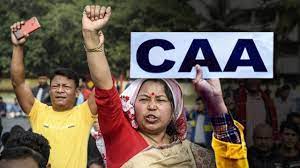Biju Dharmapalan
The opposition to the newly promulgated contentious Citizenship (Amendment) Act 2019 (CAA), by political parties and intellectuals needs introspection. These parties spread a lot of false information to create panic in society. The lies go to the extent that all citizens belonging to minority communities like Muslims need to leave the country in the long run. The Prime Minister and Home Minister have repeatedly clarified that the rule is not against any citizens of Bharat. The CAA rule pertains to the persecuted minorities- Hindus, Sikhs, Buddhists, Jains, Parsis and Christians, living in our neighbouring countries that were part of Akhand Bharat once. The new rule is a fast-track mechanism to attain Indian citizenship for these persecuted communities. The new rule is a great relief for our fellow brethren who were divided from their homeland during partition. The scars of the partition of Akhand Bharat by the colonial rulers are still not healed properly, with members of families living across the boundaries. The historical injustices meted out to these communities can be normalized through the new rules. CAA reflects India’s commitment to humanitarian values by offering shelter and assistance to persecuted minorities fleeing religious discrimination in neighbouring countries. Granting citizenship to persecuted minorities can facilitate their integration into Indian society and enable them to contribute to the country’s economy. These individuals often bring valuable skills and talents, which can benefit various sectors of the economy and contribute to overall growth and development.
It’s not clear why opposition parties object to the new rules. Is it because the government is attaining public attention during election time? Or is it that the present Government showed courage to fulfil whatever it has mentioned in its previous election manifesto? Or is it that they oppose all of the CAA rules?
One opposition to the new rules is that the Muslim community has been purposely removed from the list, and being a secular country, there can’t be mention of religion in the law. The rule is to help the persecuted communities who have taken asylum in our country, and in none of the countries stated in the rule, the Muslim community is not a minority. Hence, the question of including the community doesn’t arise. Suppose the opposition is for mentioning a religious name in the act in a secular country; why do we have the Christian Marriage Act, Hindu Marriage Act, Muslim Women (Protection of Rights on Marriage) etc. Why don’t these opposition parties oppose this?
Of course, there are a few genuine concerns regarding the structuring of CAA rules, like the exclusion of certain sub-sects and communities who have been persecuted in our neighbouring countries, especially the case of Sri Lankan Tamils living in the country. However, these concerns could be addressed in the proper forum. Even when these minor concerns can be corrected, the rule doesn’t do any harm to any Indian citizen, irrespective of religion. In fact, this will help properly compile the National Register of Citizens (NRC).
Most of our states that share international borders face the issue of illegal immigration. Since these people share almost the same cultural practices and physical appearance, it is challenging to identify these migrants when they mingle with the local population. These kinds of illegal migrations sometimes pose a national threat. Moreover, they will be sharing the resources meant for our citizens. The political parties that oppose CAA or NRC should state whether they want to compromise national security. The affected parties in the rule are mainly living in the regions that share International borders, but it’s not clear why states like Kerala are opposing this rule that is promulgated for the sake of persecuted immigrants.
Providing refuge to persecuted minorities can contribute to regional stability by reducing tensions and conflicts in neighbouring countries. By offering a haven to these communities, India can play a constructive role in fostering peace and stability in the region. Even the great leaders of our constituent assembly were in favour of giving citizenship to our fellow brethren persecuted by the scars of partition. Rather than the amended rules of CAA, it is false propaganda by political parties that creates cramps in society. CAA can help India fulfil its moral and humanitarian obligations, promote regional stability, strengthen secularism, harness economic potential, enhance diplomatic relations, and bolster security efforts.
(The author is a science communicator and columnist)


